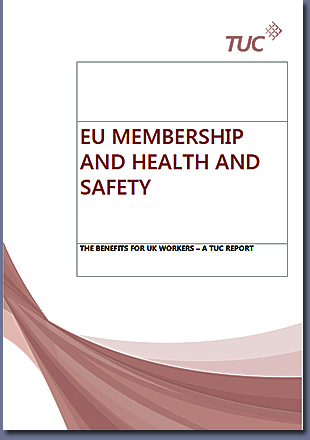Ahead of next months EU Referendum, CWU's Dave Joyce explains the issues with regard to workers rights and more specifically; health and safety at work.
In doing so he highlights a TUC report which clearly concludes that leaving the EU could put millions of UK workers at greater risk of work related accidents, injury and ill-health.
Contrary to the lies being told about the EU and law making, the EU Comissioners DO NOT make laws. That is done by the European Parliament of MEPs from all member states. WE elect OUR MEPs to act on our behalf just as we do our MPs to Westminster.
Dave Joyce explains further:
 The TUC Report concludes that EU Membership has had a very positive impact on Health & Safety, through the introduction of EU wide legislation.
The TUC Report concludes that EU Membership has had a very positive impact on Health & Safety, through the introduction of EU wide legislation.
Once passed by the European Parliament, 'Binding' European Commission Health and Safety Directives are issued to all member states, like the UK, who have to 'transpose' the Directives into UK Law and then introduce the Laws in full and as effectively as intended by a deadline date.
Each directive contains a deadline by which Member States must adopt national transposition measures which incorporate the obligations of the Directive into national law. Member States are subject to close monitoring and must provide the Commission with the texts of transposition measures. The Commission then examines them to ensure that they achieve the results required by the Directive. The Commission verifies what measures national authorities have taken to incorporate EU Directives into national law. If a Member State fails to transpose an EU Directive's measures completely, such as a Health and Safety Directive for example, an 'infringement case' is opened against the Country concerned and action is taken to ensure compliance. The Country/State then has an opportunity to correct the situation before a formal reference to the European Court of Justice.
The UK has faced a number of 'infringement actions' forcing it to amend and strengthen UK Health and Safety Laws.
In 1996 - the then Tory UK Government had fought tooth and nail against the Working Time Directive but in 1996 the EU Court of Justice ruled against the UK's complaints and instructed the UK to implement it. The UK Working Time Regulations were eventually introduced by the new Labour Government in 1998.
In 1999 – the European Commission (EC) forced the UK Government to amend the Management of Health and Safety at Work Regulations for not implementing the EU Directive (89/391/EEC) correctly and the UK remove the “civil liability exclusion” both from the Management of Health and Safety at Work Regulations 1999 and the Fire Precautions (Workplace) Regulations 1997 for breach of statutory duty towards employees. Amending Regulations were brought into force in October 2003 – the Management of Health and Safety at Work and Fire Precautions (Workplace) (Amendment) Regulations 2003 removing “civil liability exclusions” from both.
In 2014 the UK faced legal proceedings and substantial fines from the European Commission as a result of its failure to meet air pollution limits of "excessive" levels of nitrogen dioxide (NO2) air pollution from traffic, despite years of warnings and several extensions and postponements granted to the UK Government.
Health and Safety was transformed in Europe in 1986 with a Single European Act, following which there was a significant increase in the volume of health and safety Directives. It abolished national vetoes in a host of areas, including health and safety, increased the legislative powers of the European Parliament and made the first commitment by member states to create a "European Union". This was despite persistent opposition by the Tory UK Government of the day.
In May 1989, the Commission adopted a preliminary draft for a Community Charter of Fundamental Social Rights which included the right to protection of health and safety in the workplace.
The then Tory Prime Minister Margaret Thatcher characterised the Charter as "Marxist interventionism".
Much of the health & safety law in the UK is now underpinned by the EU, says the report.
Almost two-thirds (63%) of new British health & safety regulations introduced between 1997-2009 originated in Europe (41 out of 65 laws).
 In respect of health and safety, the biggest change was the Health and Safety Framework Directive (89/391/EEC) and five “daughter” directives[i] which established broad-based obligations on member states to ensure that employers evaluate, avoid and reduce workplace risks in consultation with their workforce. Workers and their Trade Unions benefitted in the UK as the UK government had to comply and transpose the Directives into UK Regulations, resulting in:-
In respect of health and safety, the biggest change was the Health and Safety Framework Directive (89/391/EEC) and five “daughter” directives[i] which established broad-based obligations on member states to ensure that employers evaluate, avoid and reduce workplace risks in consultation with their workforce. Workers and their Trade Unions benefitted in the UK as the UK government had to comply and transpose the Directives into UK Regulations, resulting in:-
- The Management of Health & Safety at Work Regulations
- Manual Handling Operations Regulations
- Display Screen Equipment (DSE) Regulations
- Workplace (Health, Safety and Welfare) Regulations
- Provision and use of Work Equipment Regulations
- Personal Protective Equipment (PPE) Regulations
These new safety rules have contributed to a reduction in workplace fatalities in the UK, helped stop illnesses and injuries at work, and saved lives.
In 1992 there were 368 worker fatalities in Britain; this dropped to 142 last year. Over this period, the rate of deaths fell from 1.5 to 0.46 per 100,000 workers.
The new TUC report notes several areas where EU law has had a significant impact:
- The EU forced the UK to strengthen safety rules in construction – one of the most dangerous industries.
- Rules protecting Police officers were also made stronger by the EU.
- The EU increased protections against asbestos. Asbestos is the biggest cause of occupational death in the UK – causing 5,000 deaths a year.
If the UK votes to leave the EU, the Government would be able to decide whether or not to keep protections derived from EU laws. There is no guarantee that they would keep health & safety legislation at its current level.
In fact the Government has indicated it wants to reduce this so-called ‘red tape’ of EU protection.
Trade unions have fought for protections from dangerous workplaces for as long as we have existed.
The TUC and CWU have concluded that voting to leave the EU is a big risk for people’s safety at work. Leaving the EU could see many of the vital protections that keep workers safe in shops, factories, offices or on building sites stripped away, leaving millions of people at increased risk of accident or injury in the workplace. The present Tory Government has already clearly indicated its readiness to water down key health & safety rules via a continuation of its programme on non-stop attacks on health and safety which has been limited only by the EU and EWU Directives.
Should Britain vote Leave in June, there would be nothing to hold it back. And we know that some of the biggest political supporters for 'Brexit' see protections for ordinary British workers – like health and safety law – as just red tape to be binned.
 In conclusion:
In conclusion:
The EU is not a perfect organisation, it has to be said, and a decision to support staying in is one of balancing the pros and cons. At a recent meeting with ETUC Representatives the CWU's health and safety concerns were made clear in relation to the EU's 'International Trade Deals' discussions TTIP (Talks with USA), CETA(Talks with Canada) and TSA (Talks with 23 Countries) which threaten Health and Safety Standards (as the talks attempt to equalise safety standards with the trading partner nations) and this is an area that needs to be a priority for the TUC and ETUC to ensure the deals are amended.
We also emphasised that other priorities in Europe for the ETUC must be campaigning on Psychosocial Risks (Mental Health, Work Stress, Suicide etc) and Musculoskeletal Disorders (MSDs), particularly in manual intensive industries with an ageing workforce.
However, the TUC and CWU is campaigning against withdrawal from the European Union, by emphasising the many positive changes for workers in the UK have happened directly as a result of EU membership and making a strong case for a social Europe.
In recent years, EU-led improvements in health and safety protection have been more limited than in the past, but the overall contribution of EU regulations on health and safety to the UK workforce is substantial. As shown by the recent evaluation of EU regulations, the overall package of directives is practical, fit for purpose, and, more importantly, effective.
It is clear that EU membership continues to deliver wide-ranging protections to UK workers, and the UK Government should not only continue to be part of the European process, but should more actively engage and support an improved and revitalised package of measures aimed at tackling the huge burden of occupational illnesses that are being experienced both in the UK and across the EU.
At the same time, the European Commission needs to expand its work programme to include new regulatory initiatives on health and safety to help make the case to British workers for remaining in the EU. Further work should be done at both Commission level, and by EU-OSHA, on developing the evidence base for the benefits of EU membership on workers’ safety, health and well-being, as well as on living standards and equality in all member states, and that the findings be used to make the case for strong, effective, regulation on workers’ rights across Europe.
Click the cover pic above to download a copy of the Report: "EU MEMBERSHIP AND HEALTH AND SAFETY - THE BENEFITS FOR UK WORKERS".
The report will remain available too from the E-Library Database
Source: CWU / TUC


 The TUC Report concludes that EU Membership has had a very positive impact on Health & Safety, through the introduction of EU wide legislation.
The TUC Report concludes that EU Membership has had a very positive impact on Health & Safety, through the introduction of EU wide legislation. In respect of health and safety, the biggest change was the Health and Safety Framework Directive (89/391/EEC) and five “daughter” directives[i] which established broad-based obligations on member states to ensure that employers evaluate, avoid and reduce workplace risks in consultation with their workforce. Workers and their Trade Unions benefitted in the UK as the UK government had to comply and transpose the Directives into UK Regulations, resulting in:-
In respect of health and safety, the biggest change was the Health and Safety Framework Directive (89/391/EEC) and five “daughter” directives[i] which established broad-based obligations on member states to ensure that employers evaluate, avoid and reduce workplace risks in consultation with their workforce. Workers and their Trade Unions benefitted in the UK as the UK government had to comply and transpose the Directives into UK Regulations, resulting in:-